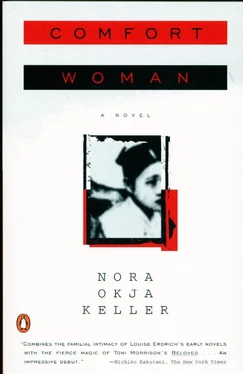At Ala Wai Elementary, where I was enrolled, I was taught that if I was ever in trouble I should tell my teachers or the police; I learned about 911. But in real life, I knew none of these people would understand, that they might even hurt my mother. I was on my own. At least until Auntie Reno discovered my mother’s potential.
The way Auntie Reno tells it, she was the only person who would hire my mother. Though my mother could speak English, Korean, and Japanese—which was a big plus in Waikiki—she had no real job skills or experience. “Out of dah goodness of my heart, I wen take your maddah as one cook,” Auntie Reno told me. “Even though she nevah even know how for fry hamburgah steak.”
The first few months on the job, my mother did well, despite the oil burns on her arms and face. Then the spirits—Saja the Death Messenger and Induk the Birth Grandmother—descended upon her, fighting over her loyalty and consciousness. During these times in which she shouted and punched at the air above her head, dancing as if to duck return jabs, I was afraid to let her out of the house, both because she might never come back and because—like a wandering yongson ghost finding its way back to its birthplace—she might. After roaming the streets, she could have led everyone back to me, the one who would have to explain my mother’s insanity. Each morning during her spell, I locked the door on her rantings and ravings, and each afternoon I raced home, fearful of what I’d find when I slipped back into our apartment.
The day Reno found out about my mother, I had just come home from school to find her dancing. At first I thought that she was back to normal, having fun listening to the radio or trying out a new American dance step, the bump-and-grind the teenagers were doing on Bandstand every week. But then I noticed the silence. Arms flailing, knees pumping into her chest, my mother danced without music. She must have been dancing a long time in that hot, airless apartment, because she was drenched in sweat: her hair slapped against, then stuck to her blotchy face, and water seeped from her pores, soaking the chest and underarms of her tunic blouse.
“Mom,” I yelled at her. When she didn’t look at me, I tried to grab one of her arms. She wrenched herself away and kept dancing.
“I got something for you to eat.” I held up the part of my school lunch that I had wrapped in a napkin and brought home: half of my pig-in-the-blanket and a peanut butter cookie. I could not remember the last time she ate. I remember hoping that she had eaten while I was at school, but when I checked the refrigerator and the cabinets, whatever food we had seemed untouched.
She danced away from me, hearing music I could not hear, dancing and dancing until her rasping gasps for breath filled the air and permeated each bite of pig-in-the-blanket I took. The food tasted like sweat and hot air, but I ate because I was hungry and because I could not let it go to waste. I ate everything, not even saving any of the cookie to place on the shrine on top of our bookshelf, because I was mad at the spirits and at God for taking my mother away from me.
While I tried to do my homework and my mother continued to dance, Auntie Reno came pounding at our door. “Let me in,” she bellowed. “I know you in dere, Akiko! You slackah! You lazy bum! You owe me for leaving me short so many days!”
I ran to the door and yelled through the crack: “Mrs. DeSilva-Chung, my mom is sick.”
“Lie!” she yelled back. “How come when I wen call, I heard her laugh and laugh and den hang up?”
“Uh,” I answered, trying to remember if I had forgotten to unplug the phone before I left for school.
Sweet Mary, the woman who lived next door, kicked the common wall between us so hard that the dishes in our sink rattled. “Shaddup!” she screeched through the walls. “I goin’ call dah police! Whatchu think this is, Grand Central Station?”
Mrs. DeSilva-Chung, my Auntie Reno, yelled back, “Eh, you shaddup!” but she stopped banging the door and made her voice real sweet: “If you don’t let me in, Rebeccah honey, I dah one goin’ call dah police.”
I unsnapped the locks and pulled the door open. “Won’t you please come in?” I told her. Behind me, I could hear my mother panting and wheezing.
“Ho,” Auntie Reno said as she pushed her way past me. The blue-and-silver scarf she had wrapped around her poodle-permed head snagged on the doorframe. “Goffunnit,” she grumbled, yanking the scarf away from the frame. She folded the scarf over her hair, tucking the tight curls under the cloth. “Where’s your maddah?” she growled, and when she looked up and saw my mother twirling in her see-through clothes, Auntie Reno breathed, “Ho-oly shit,” and let the scarf float to the floor.
I closed the door and watched Auntie Reno watch my mother. A spider’s line of spittle swung from my mother’s gasping mouth as she swayed from the top of the coffee table. When she finally dropped to the ground, her chest heaving as she gulped air, Auntie Reno said, “Wow. I never seen that before.”
“Shut up!” I marched over to where my mother lay and folded my arms across my chest. “She’s not crazy!”
Auntie Reno looked at me, then blinked her eyes slowly, so that I could see the wings of her sparkly-blue eye shadow. “Honey girl, no one evah told you nevah jump to conclusions?” She walked forward. Stopping in front of me, she bent down and touched my mother’s face.
My mother’s eyes opened. “Why have you come here? Dirty person from a house full of mourning, tend to your own mother: Teeth are biting at her head, and rats are nesting at her feet.”
Auntie Reno gasped. “What dah hell dat crazy woman saying?”
“Bad girl, bad daughter!” Rolling into a crouch, my mother yelled at Reno. “You pretended to take care of her, wiping her drool and her gundinghi, but you only wished for her to die! You only wish to save money for yourself. You wouldn’t buy your mother a decent bed in life, and look, now, you won’t buy her one in death—”
“No!” I rushed forward to put a hand over my mom’s mouth. “She doesn’t know what—”
Auntie Reno waddled quickly to the door. “I jus’ go now. Uh, I call her wen she feeling better.” She bent to pick up her scarf.
Before I could stop her, my mother rushed toward Reno and grabbed the scarf. She twined it around her own neck, closed her eyes, and started to rock back and forth on the cushions of her feet. “You, Baby Reno, you always wanted dis scarf. So did your sister, but I nevah wanted for you two for fight over um. ‘Bury it wit me,’ I told you. You made me one promise, you good-for-nuttin‘, and still you wen tell yoah sister I gave um to you.”
Reno dropped to her knees. “Oh my God,” she groaned. “Eh, Mama, wasn’t li’ dat, I swear on your memory.”
“Mommy, stop,” I said, jumping up to untangle the scarf from her neck. I pulled it from her, felt the sweat that had soaked into the material, and offered it to Reno. “I’m sorry,” I said. “My mother is sick, and sometimes she just starts talking about nothing, rambling on about anykine stuff.”
“Try wait, Mama—please no leave me again.” Auntie Reno crawled to my mother’s feet. “Mama? Akiko-san? Please,” she whispered, “you can tell me anyting else?”
My mother hummed, then went to lie down on the couch.
Reno wiped at her eyes, smudging her makeup, and listened for a while to my mother’s monotonous buzzing. “Your maddah might be one crazy lady,” she said, holding up her hand when she thought I would protest, “but she got dah gift. She was right, you know.” She glared at me, knotting the scarf in her fist and quickly adding, “Not about everyting: my maddah did say I could have dis as one—whatchucail—keepsake; my sistah only tink I was suppose to bury em wit dah body. But—and I stay shame for dis—I nevah put my maddah’s remains where she asked, and now the city moving all dah graves where my maddah stay. Tractahs digging em up now.
Читать дальше













